Granma 299
Cuba hands over US citizen sought by Interpol

Cuba hands over US citizen sought by Interpol
On Thursday, August 9, the Government of Cuba handed over to the authorities of the United States government the US citizen Joseph Mahmoud Dibee, who is wanted by the US justice system and who is also subject to an Interpol arrest warrant with a Red Alert.
———————————————————
The Government of Cuba handed over to U.S. government authorities on Thursday, August 9, the U.S. citizen Joseph Mahmoud Dibee, who is wanted by the U.S. justice system and who is the subject of an Interpol arrest warrant with a Red Alert, the daily Juventud Rebelde reports.
Author: Digital Editor | internet@granma.cu
August 11, 2018 10:08:20
Information published on the CubaMinrex website of the Ministry of Foreign Affairs of Cuba details the following:
On 9 August 2018, the Cuban government handed over to United States government authorities in Havana a US citizen wanted by the US justice system for crimes committed there, who is also facing an Interpol arrest warrant with a Red Alert. This citizen entered the national territory on July 31, 2018.
This action is based on Cuba’s strict compliance with its international legal obligations and existing bilateral agreements with the United States on compliance and enforcement, and the cooperation that both Governments are developing on that front.
Interpol’s Red Alerts refer to people who are being sought by national jurisdictions. What it stipulates is the arrest or provisional arrest of the persons sought for extradition. The legal basis for issuing a Red Alert order is the arrest warrant or judicial decision issued by the judicial authorities of the interested country.
New Face of Palestinian Resistance

Ahed Tamimi, the new face of Palestinian Resistance
The 16-year-old girl arrested by the Israeli army two weeks ago has become a symbol of Palestinian resistance.
Author: Ernesto J. Gómez Figueredo | internet@granma.cu
January 5, 2018 01:01:52
A CubaNews translation.
Edited by Walter Lippmann.

The international campaign for the liberation of Tamimi, the new flag against imperialist policy in the Middle East. Photo: PalestineFree Photo: Palestinalibre
With curly, thin, brave hair, that’s the image of Ahed Tamimi, the 16-year-old girl arrested by the Israeli army two weeks ago who has become a symbol of Palestinian resistance.
An Israeli military court charged the teenager with 12 crimes after the incident in which she slapped a Zionist army soldier after he entered her backyard.
Thanks to his family’s filming of the events, images of his resistance went around the world.
Tamimi is one of many minors arrested by the Zionist army for the purpose of being “interrogated” about alleged illegal activities. Army spokesmen confirmed that Ahed is charged with “assaulting a soldier”.
“She argued with the Zionist Defense Forces because her cousin Mohammad, 15, had been shot,” her father said. The Israeli version is that they were “throwing stones”.
According to the Committee for Palestinian Prisoners’ Affairs, the number of Palestinians detained by Israeli security forces since US President Donald Trump declared Jerusalem the capital of Israel on 6 December has risen to 610, including 170 minors.
The young woman lives in Nabi Saleh, 20 kilometers from Ramallah in the occupied West Bank. He claims he wants them to see them as fighters, not victims. “Ahed says she does what any Palestinian child does, but she is filmed,” her father said in an article in the Haaretz newspaper.
“I do not want to be identified as a victim, and I will not give your actions the power to define who I am and will be. I choose to decide for myself how you will see me. We don’t want your support because of photogenic tears, but because we choose the fight and the fight is fair. This is going to be the only way we will ever stop crying,” wrote the father, reproducing Ahed’s words.
Tamimi is already an international heroine of the Palestinian cause and after her arrest her mother and cousin were also arrested.
The arrest of the Tamimi family was like the fire that awaited the sleeping powder of the international community to react. For days now, social networks have been flooded with messages calling for the release of mother, daughter and cousin, under the labels #FreeAhedTamimi and #LibertadAhedTamimi.
Palestinian President Mahmoud Abbas called Ahed’s father, Basem Tamimi, a Fatah militant, and praised the family for “the key role” in the protests in his people against the Israeli occupation and settlements, according to an official statement.
“I can’t think about the future because the Israeli occupation prevents me from thinking about it. When I went to play in the streets, the army would come in and start shooting,” she said.
The international campaign for the liberation of Ahed Tamimi is a new flag against imperialist policy in the Middle East and highlights the crimes committed by the Zionist regime.
Ahed Tamimi, Rebel With a Cause

LEADING FIGURES
Ahed Tamimi, Rebel With a Cause
With her, Palestine found what the media had long ago not allowed to be seen in those parts of the world: rebellion, beyond resistance.
———————————————————————————————–
Author: Darcy Borrero Batista | darcy@granma.cu
August 7, 2018 17:08:03
A CubaNews translation.
Edited by Walter Lippmann.

The Palestinian teenager arrives at a press conference with her mother Nariman (right) in her hometown. Photo: El Clarin
She entered the Israeli prison of Hasharon at the age of 16, with abundant curly hair, uncovered, and rebellion scattered among her belongings. Eight months passed from that day until the last Sunday in July, when Palestinian Ahed Tamimi, now 17, regained her freedom from the Israeli occupiers.
With it, Palestine found what the media had long ago not allowed to be seen in those parts of the world: rebellion, beyond resistance.
The teenager did not stand idly by in the face of the abuse of her family. The video, in which she is frankly dissatisfied with the Israeli violence against her brothers, was shown as a trophy of war, as if responding to the violence were, in this case, a peaceful exercise and not an act of rebellion.
Because of the way they act, it is not possible to speak of the symbolic as something common. In a thinner and thinner strip, Tamimi gets up the way flags do and while some want to make it look like they’re touching the ground, the airs of real struggle make them rise to the top of the flagpole.
Her adolescent face then emerges as a challenge to the status quo, even if the Israeli regime seeks to grab the pole with no other limit than to lower the Palestinian flag and keep the territory on the other side of the line.
Moving the U.S. embassy to Jerusalem, the capital of Israel – a state conceived for the Hebrew vindication after the racist anti-Semitic war unfolded by fascism – sets in motion the conflict in which Tamimi emerges as the voice of an urgent humanitarian cause: the cessation of extortion against the Palestinians, who are increasingly losing their land, their freedom and even their right to a dignified life.
Since she was imprisoned, Tamimi’s videos – the last of them slapping and kicking an occupying soldier in her village, the occupied West Bank, and the first threatening to punch a soldier after her older brother was arrested – have been manipulated in many ways. There are those who call them “Pallywood” in a mocking tone and say that the teenager is exploited by her family, who are accused of using her to try to provoke the Israeli soldiers.
The difference between the two videos is several years. The most recent was recorded on December 15 and the oldest when Tamimi was 11 years old.

Three out of four Palestinians detained by Israel are youth or adolescents. PHOTO: palestinalibre.org.
Tamimi seems to have plenty of hope despite all that she experienced at her young age. In a certain way, she reflected this when she said: “power is in the people and the people are the masters of their destiny and their future”. Her followers responded with applause.
The young woman also showed her solidarity with the Bedouin people of Khan al-Ahmar, who are awaiting demolition by Israel, and refused to answer questions from the Israeli media. Instead, she expressed appreciation for the media support received during the months of her imprisonment and hoped that the campaign for her release would be extended to the rest of the Palestinian adolescents who remain in Israeli jails.
Remember that this girl was arrested in December and sentenced on March 21, after accepting a suffocating agreement with the Office of the Prosecutor and assuming the charges of aggravated incitement and aggression, among others. Thus they condemned the rebellion with Tamimi’s cause. It would be necessary to see in which court it is condemned to the Israeli soldiers, the “defenseless” ones that take to jail to these adolescents, only to give them a slaps full of dignity and love to theirs.
IN CONTEXT:
– The Government of Israel applies the age of criminal responsibility for Palestinians to 12 years. In addition, children can be imprisoned for up to five years for just throwing stones.
– Every year, between 500 and 700 Palestinian children in the West Bank are arrested and interrogated by Israeli forces before being tried in military courts. Most of them are accused of throwing stones.
– Since 2000, some 7,500 Palestinian children aged 12 and over have been detained and tried by this judicial system.
– According to a report by Defense for Children International, a total of 210 children and one girl are currently in prison in Israel, 34 of them under the age of 16.
– Nearly two-thirds of Palestinian children and minors detained by the Israeli regime in 2017 were abused by their captors, according to a report by the Palestinian non-governmental organization Military Court Watch.
– International law prohibits the use of the death penalty for crimes committed by persons under 18 years of age.
A cool socialism (III)

A cool socialism (III)
Author: Félix López
A CubaNews translation.
Edited by Walter Lippmann.
We come today to young Alejandro’s third and most complicated paradox: “If not socialism, what do we have left?” It would seem our young man was looking for an exit on the expressway, but I don’t think so since he already made it clear he goes for a cool socialism. Well? Nothing, I can see he wants and needs to know what the non-socialist option has in store for us. And I will answer him without using the worn-out tale of the Big Bad Capitalistic Wolf devouring the Proletarian Little Red Riding Hood.
What’s at stake is a lot more than a remake of a children’s story: history, maybe life itself; our ecology and future; our happiness and existence. Socialism is all that and even more: the sworn enemy of selfishness and inequality, boundless consumption and violence, warmongering and expansionism, drugs and pornography, a lifestyle based on foolishness and glamour… all synonymous with capitalism, designer of a society where –contrary to Martí’s precepts– the more you have to show off, the more valuable you are; where it’s not how you think but how well you’re dressed and what brand your cell phone is what matters; where people’s worth is measured by their fortune –ergo, the have-nots are not people– and the ID cards have been replaced with credit cards; where a mall is more worshipped than a university; where, according to Eduardo Galeano, to praise a flower you say, “it’s so beautiful you’d think it’s plastic!”
If not socialism, Alejandro, barbarism would be the only option left to us. I’m sure that capitalism would waste no time in presenting us with an oasis of spotless showcases and the mythical junk food franchises would compete for the best spots downtown where they could create a mirage of lights and affluence, as they did in the former USSR… and all the while that artificial bubble would be surrounded in a flash by a poor area with no schools but teeming with gangs; with no jobs but many prostitutes; with nothing to dream about but lots of drugs to forget that fact; with no quality lifestyle but the required TV set to sell you all kinds of comforts… and you bet I’m not even mentioning the terrible dangers fueled by deep-seated hatred.
There’s another, simpler and more realistic answer to Alejandro’s question: you either make sure you become an enterprising optimist and strive to build a cooler socialism –so you can keep your freedom and at the same time have a better and happier life– or risk your neck at the Russian roulette in a casino and end up finding out that in the realm of “every man for himself” even your smile can be mortgaged. It’s no coincidence that Silvio Rodríguez, who has traveled around the world and gives us through his music a kaleidoscope of life, voiced his support of a perfectible socialism in his capacity of Deputy to our National Assembly of the People’s Power, making it clear that we can improve ours and we must do it by ourselves.
President Raúl Castro warned in a recent speech that he had not been elected to restore capitalism in Cuba and invited all Cubans to discuss what kind of socialism we want. If we ever lose the gift of participation the Revolution will have lost its sense of direction. Hence the importance that we, our parents and our children, that is, three or more generations of Cubans –in one of which Alejandro belongs– take part in this get-together and engage in a collective reflection free of slogans and mechanistic attitudes.
I feel certain that our socialist values will come out stronger as a result. Not long ago, on the occasion of the Cuban Revolution’s 50th birthday, a number of young intellectuals were invited to talk about it and the realization of the socialist project. What follows is just a thumbnail sample of their comments sufficient to understand how necessary and comprehensive is the debate awaiting us:
Julio César Guanche: “In 1959, the Cuban Revolution gave birth to a beautiful specimen of utopian socialism and implemented on Cuban soil a significant part of Rousseau’s great ideal: universal citizenship, a sovereign society, and social justice. Fifty years later, Cuba realized that a revolution is not the ultimate goal, as every thing conquered must be re-conquered and changing with the times is the only way to move on”.
Ariel Dacal: “We must publicly discuss how we understand socialism and what to do to make it more effective in its quest for an anti-capitalist alternative, which entails as much social justice as possible. People’s education, culture, technical ability, feelings and political knowledge are underrated and in some cases wasted. In order to reverse that situation we must make qualitative changes in the way people get involved in the management and control of their daily individual and public life, both as workers and community members”.
José A. Fernández: “Our Socialism has fought against poverty, capitalism, imperialism and its worst manners –war and terrorism– as well as against the immobility of state bureaucracy, political ignorance, the opportunism of the alleged extremists, the tiny internal opposition and the strong external opposition, the ghost of the ‘siege’ that prevents us from trusting our own potential to be freer… We have contributed the beauty of a whole people of women and men forged with blood and fire, blockade and militia, lack of resources and a wealth of wisdom and faith in the justice we have earned”.
I hope that both young Alejandro and those who read these comments found in them food for thought, issues to debate, new questions and some answers. Many people deem a discussion about socialism in present and future tense a thorny subject. Rest assured that if we do it in public, using a pro-positive key instead of drawing up an inventory of problems, we will no longer be treading on waste land. The forest is crawling with snipers.
We have to keep creating and learning if we want to make progress and be better. With the energy of our people and Fidel’s endless supply of creative thoughts we have done what once seemed impossible: we saved socialism.
A cool socialism (I)

A cool socialism (I)
Author: Félix López
A CubaNews translation.
Edited by Walter Lippmann.
Amid the wide assortment of comments caused by the quotation from Che Guevara in my previous installment (*) was an unexpected, if pleasant, surprise. Alejandro, a friend of mine’s teenage son, called to ask me three questions: “If the founders of socialism ended up straying from their course, how come we cling to it even more? Why does socialism seem more concerned about ideology than about aesthetics? And, if not socialism, what do we have left?”
Truth is, I hung up the phone in astonishment. Alejandro is about to turn 16, and I know for a fact he doesn’t have his head in the clouds. Be that as it may, I was struck dumb, because we often take it for granted that they don’t care about these topics or about politics, or worry that they will never grow fond of what their parents built. Big mistake! Alejandro is a faithful reflection of a reality that can be collective of necessity: our debates today won’t be any more to the point if we push aside our teenagers and youths, strip them of their right to argue and deny them the chance to participate that they expect to get from us.
It’s with great pleasure that I answer Alejandro’s questions, and I’ll start with “the founders of socialism”. Most of us have been brought up in the [almost geographic] belief that Eastern Europe –and particularly the former USSR– is the cradle of socialism, and therefore came to the conclusion that those who once raised the socialist banners were the same ones who set that ship adrift and gave up an ideal born to make up for, and become an alternative to, the capitalist system.
But in his questions, brief as they are, a historic error comes to light. It may be true that this social system was conceptualized there, but we can’t overlook the fact that there were previous experiences of socialist coexistence. In South America, for instance, we had the so-called reservations of the Jesuits, who lived in Paraguay and its neighboring regions between 1609 and 1767, when the Catholic Monarchs expelled the Society of Jesus from their South American colonies.
The Jesuits had committed an unforgivable “sin”: they took the Indians out of the jungle, trained them in agricultural techniques and craftsmanship, and taught them to read and write, not without respect for their Guarani language. Instead of the whip, they used music as an educational tool. That’s how European instruments from that time like the flageolets, drums and harps arrived in such distant lands and joined the rhythm of the maracas the Guarani shamans moved to during their sacred dances.
That its colonies were being home since the early 17th century to a state where they looked at what we now know as socialism was utterly unacceptable to the Spanish Crown. That’s what Paraguay was at the time, a land of collective work, discipline, prayers, solidarity, learning and music. The first of such towns was San Ignacio Guasú, established in 1609 and soon followed by another forty missions along the banks of the rivers Paraná, Uruguay and Tape. By the mid-eighteenth century, according to historian Justo Fernández López, around 150,000 were already living in them.
Each mission made up a town, built around a great square and managed by a town council. There was also a church, a school, workshops of various arts and crafts, and a hospital. Surrounding them were lands devoted to intensive farming, where every native worked in a specific plot as well as in a collective field. Their economy was organized as a function of community work, and trade took place on the basis of reciprocity among the members, whether local or from other towns.
A deeper look into Latin American history we’ll reveal further –and more recent– genuine expressions of a creative and anti-dogmatic socialism. One example: Julio Antonio Mella, the young founder of Cuba’s Marxist-Leninist party, made it clear it was not his intention to reproduce here the Bolshevik experience and, at the same time, made a prophetic warning: the Party needed thinking human beings, not domesticated ones. He was not even 21 years old yet and was already speaking of a socialist revolution, only in the Cuban style.
And long before Venezuela’s Hugo Chávez and Ecuador’s Rafael Correa plotted the route toward the 21st Century Socialism, another young man, the Peruvian José Carlos Mariátegui, had stated: “Socialism in America will be neither a replica nor a copy, but a heroic creation”. If we talk about creation, then there can’t be just one kind of socialism, much less one owned by someone. It has been proved in practice to be a diversified system daring enough to be different in different places.
That’s why I’m correcting Alejandro, who is wrong to assume that there was only one type of socialism which ceased to exist on the day that a crane knocked down the last of Lenin’s statues in Moscow. At any rate, here we are, clung to our socialism, the one with its roots in Martí and Latin America. An “always perfectible” socialism, as singer-songwriter Silvio Rodríguez put it: “Without giving up dreaming and wishing a better society with better human beings, but from the perspective we have today, not the one indicated by the pioneers of socialism”.
This being said, let me tell you that in my conversation with Alejandro I also learned that all around us there are youths whose grasp of history overpowers the gaps in their knowledge when it comes to conceiving a picture of the system they want to have. Alejandro knows how to be a fair critic, voicing his disagreement with ideas of his own and never disowning the society where he lives. However, when I asked him which system he likes better, he immediately chose the path of creation with great self-assurance: “I like a cool socialism”. A “model” we’ll leave for the next article.
(*) “Socialism is young and therefore flawed”, Chapucerías, Granma, 31.08.09
Gender Equality, Marriage and Family

Temperature Rising:
Gender Equality, Marriage and Family in the New Constitution
This is a dialectical and modern Constitution, if tradition is to be broken, tradition is to be broken, because breaking tradition is also a revolutionary act. Under socialism there is no room for any kind of discrimination against humans. Love does not have sex,” stressed intellectual Miguel Barnet.
————————————————————————-
Author: Susana Antón | susana@granma.cu
July 22, 2018 12:07:10
A CubaNews translation.
Edited by Walter Lippmann.
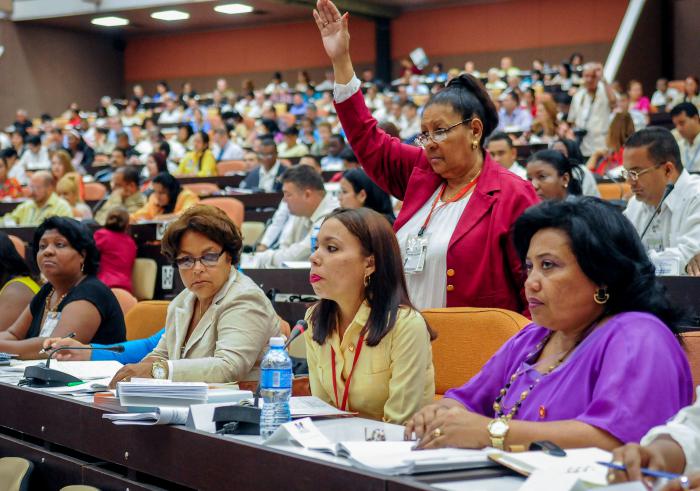
1st Period of Sessions of the IX Legislature of the National Assembly of People’s Power July 2018, at the Palacio de Las Convenciones, Photo: José Manuel Correa Photo: José Manuel Correa
As part of the analysis of the Draft Constitution at the First Ordinary Session of the Ninth Legislature of the National Assembly of the People’s Power, some of the issues discussed were gender equality, marriage and family as part of Article 68.
Mariela Castro Espín, a deputy for the municipality of Plaza de la Revolución, commented that with Article 68, Cuba places itself, from a perspective of comprehensive protection of people because of their sexual orientation and gender identity, among the leading countries in the recognition and guarantee of human rights.
“This proposal for protection is the result of the maturity reached by the revolutionary process that legitimizes and protects social relations that materialize in various types of families, from which the State’s duty to protect them and not to discriminate against them is derived,” she said.
She expressed her agreement with the provisions of Article 68, which provides for the voluntary union of two persons with the legal capacity to do so and is based on the rights and duties of spouses.
Castro Espín submitted for the plenary’s consideration that the continuation of the text of the article should be left to legislation because it is specific and refers to the obligations of couples who choose to be mothers and fathers, in addition to the fact that it is based on the absolute equality of the duties and rights of the spouses and on the conditions that favor the achievement of their ends.
“It would result in an axiological and normative contradiction in the letter of the constitutional bill between the grounds of discrimination, sexual orientation and gender identity in Articles 39 and 40, and we would discriminate against families with gay parents in Article 68,” she added.
On the other hand, she stressed that Article 41 stipulates that the State works to create the necessary conditions to facilitate equality of citizenship and “the best way to say it is to do it”, she concluded.
For her part, the Secretary General of the Federation of Cuban Women, Teresa Amarelle Boué, commented that it is a step forward that it has been taken away that marriage is the consensual union between a man and a woman..
However, there is no mention of adoption in this Article, and this is an issue that should be left to the Family Code and that should govern what marriage and other issues will be like.
“No one can be discriminated against because of their orientation. All rights are for all people and it is up to couples who want to be mothers and fathers to decide,” said Teresa Amarelle.
On the subject, Homero Acosta commented that the concept of matrimony that has been changed has an impact on the continuation of the article because it has a vision of a single-parent family and the issues related to children have a different formulation in the article.
The issue of children is regulated in Articles 69, 70 and 72, which refer to a concept of the family. “In no way does it limit the obligation of parents, whatever marriage in which it is constituted,” he said.
Yolanda Ferrer, deputy for Pinar del Río, commented that marriage must rest on the absolute equality of the duties and rights of the spouses and the law must determine the way in which it is constituted.
“We are taking a revolutionary and very important first step. There is no justification for depriving the happiness of forming a family. We have to face prejudice and make the justice we defend inclusive,” she said.
Speaking again, Deputy Mariela Castro Espín stated that “if we consider the reproductive issue, we must be consistent in giving these guarantees to all families”.
Miguel Barnet also commented that we are entering a new era. “This is a dialectical and modern Constitution, if tradition is to be broken, tradition must be broken, because breaking tradition is also a revolutionary act and under socialism there is no room for any kind of discrimination against humans. Love doesn’t have sex,” she said.
At the conclusion of the plenary debate on the subject, the deputies agreed to leave Article 68 as it stands and to include the terms “families” throughout the Constitution.
Draft of New Cuban Constitution Available

Tabloid for sale with the Draft Constitution of the Republic of Cuba (+ PDF)
As of Tuesday, July 31st, Correos de Cuba will offer for sale in all its units and press boxes the Draft Constitution of the Republic of Cuba which, in tabloid format of 32 pages, will be commercialized through the national postal network at the price of 1.00 peso CUP
————————————————–
Author: Grupo Empresarial Correos de Cuba | internet@granma.cu
July 30, 2018 18:07:43
A CubaNews translation.
Edited by Walter Lippmann.
The Directorate of Institutional Communication of the Business Group Correos de Cuba announced that as of Tuesday, July 31st, the Draft Constitution of the Republic of Cuba will be commercialized in all units and press boxes, in tabloid format of 32 pages, and will be commercialized through the national postal network at the price of one peso (cup).
First, on Tuesday, July 31st, it will be sold in the post office and press room units of the provinces of Havana, Mayabeque, Artemisa and the special municipality of Isla de la Juventud.
As of Wednesday, August 1, it will begin to be sold in the post office and press room units of the provinces of Pinar del Río, Matanzas, Cienfuegos, Villa Clara, Sancti Spíritus and Ciego de Ávila.
Meanwhile, starting on Friday, August 3, it will be sold in the post office and press room units in the provinces of Camagüey, Las Tunas, Holguín, Granma, Santiago de Cuba and Guantánamo.
As reported by the mass media, the draft Constitution of the Republic of Cuba will be submitted for popular consultation between 13 August and 15 November 2018.
Directorate of Institutional Communication Grupo Empresarial Correos de Cuba
Download here the Draft Constitution of the Republic of Cuba
In the Background of the Wifi

In the Background of the Wifi…
Author: Claudia Padrón Cueto
September 24, 2015
A CubaNews translation.
Edited by Walter Lippmann.
For the browsing experiences of web users to remain pleasurable in the country, the information strategy of our society must achieve a greater synergy. This is the responsibility of all those who are concerned with the education on the use of Information Technologies.
This past holiday season will probably be remembered as the “wifi summer in Cuba”. Undoubtedly the period was marked by the extension –through this type of connection– of the opportunities for web surfing at 2 CUC’s an hour. And while it is true that the price is still high for most, the wifi is welcomed.
Every day people go to the squares, parks or places with wifi reach to make use of internet navigation services. Many go to make video calls (using IMO) or check their Facebook profiles; while others find –in the wake of the wifi– a way to profit.
This is how it works in the city of Pinar del Rio: At the different access points some young people wait for new arrivals at the park or connection area and immediately offer “one hour of connection for only 1 CUC”, that is, half the official price.
They act as go-between working on commission for a percentage of the total amount collected. They take their customers/users to other persons who use their PCs and cell phones with wireless connection and sell the service to these temporary users.
Connectify Hotspot is a software –one of many– that allows sharing Internet by several users. Of course, in accepting this browsing option the speed and original connectivity potential is reduced, but still it is possible to access the web and even make video calls.
In addition to these agents of shared wifi, and of those others who hoard coupons to then sell them for 75 Cuban pesos [official price 2 CUC = 50 Cuban pesos], this journalist and some close friends were able to confirm the existence of other “merchants” who charge for a simple advice, for example: how to recharge a Nauta account that only requires to enter portal@…, and from this address type the card code.
This is a simple procedure that only takes a few minutes; but lack of knowledge makes some users resort to these “advisers” who take advantage of the inexperience and charge for the service 10 Cuban pesos. Such practices also involve certain risks, because those who offer “help” could even keep the data of the customer (username and password) and then use this information to access their accounts.
There are many who connect without even knowing how to turn on the wifi on their phone or what a browser is, what a web site, a web page or a network profile are. This is simply because without practice there is no possible knowledge. And such lack of knowledge frustrates the browsing experience of some, while others fill their pockets.
It’s been three months after the opening of the areas of wireless access service –indispensable in any modern society—and they are very much appreciated; but still the telecommunications company needs to improve its management so it is not limited only to the signing of contracts. It is also necessary to expand the benefits at the Joven Club [Free Computer Service Facilities] and provide guidance on the use of new technologies to solve the most dissimilar demands and problems of Cuban society in its way to computerization.
Schools should also join in this instruction task considering that today’s students options lead to new tools and benefits, provided by the use of ITs. These options need to be managed with dexterity so that users do not become easy preys to deception and theft.
Summertime Electricity Fraud

Summertime Electricity Fraud, An Evil with a Cure
The confrontation with electrical fraud will continue throughout the summer, a period in which this negative phenomenon for the economy is tending to grow, Nílver Guerrero Piñero, a commercial specialist with the Provincial Electric Company of Holguín, told this newspaper.
———————————————–
Author: Germán Veloz Placencia | german@granma.cu
24 de julio de 2018 22:07:37
A CubaNews translation.
Edited by Walter Lippmann.
The Essence Hidden Behind the Clown’s Nose

The Essence Hidden Behind the Clown’s Nose
The trivialization of the art of clowning is a widespread phenomenon in our society, rooted essentially in its conversion into a lucrative business.
Author: Leidys María Labrador Herrera | internet@granma.cu
29 March 2018 20:03:13
A CubaNews translation. Edited by Walter Lippmann.
A unique music sounds and at its rhythm, the picturesque character comes out, dressed in big shoes, colorful clothes, a funny wig or hat, painted face and the unmistakable red nose. He or she stumbles forward, laughs loudly and always has a joke up their sleeve.
Surely, if we were to conduct a survey of the Cuban population about their idea of what a clown is, the descriptions would more or less revolve around the one we presented at the beginning of this report. I can bet that most people would think the question was a little silly because who doesn’t know what a clown is? But this is accompanied by another question: do we really know?
We are not far from the truth when we say that behavior and clothing largely define a clown, but they are only its superficial shell. Behind that peculiar being that we see before us, there are other elements that make up its essence and that, unfortunately, have been diluted in the limbo of having certain acting qualities, some vis comic and the idea] that with that they are already suitable to make people laugh.
However, a deeper approach to this subject allows us to understand that clowning is an art that has become trivialised and commercialised in our society. Many have turned it into a lucrative business, to the detriment of the most important function of the clown: touching human sensitivity.
From the opinion of well-known personalities of Cuban theater and some of the most faithful exponents of this type of acting, Granma approaches the dilemma of the true differences between the clown who is sustained only in the material interest, and the one who starts from the actor’s ethics, the conscious dramaturgy and the need to transmit true messages to the people.
HOW DO YOU BUILD A CLOWN?
It is not necessary to be a theatre specialist to understand that any actor or actress, when she or he plays a role, if she or he does so with responsibility for her or his art and the unavoidable commitment to the audience, is capable of changing her or his skin. During the time that a production lasts, it assumes another life, other conflicts, another reality.
Building a character doesn’t mean it’s anything like him. In other words, it is possible to assume values, ways of acting, norms of behavior, even a temperament that has nothing to do with the actor’s true personality. In the case of the clown, although there must be the same level of responsibility, ethics, and commitment, the clown and the actor are the same person. The one cannot exist without the other.
This is what a man who, like many others, began as a clown for parties and birthdays, but then decided to take a step forward, because he understood the need to dignify such an ancient and vilified art. Perhaps this is the greatest merit of the group he founded and which today has become a paradigm of clowning in Cuba, Teatro Tuyo. Ernesto Parra, its director, knows very well what the birth of a clown is all about.
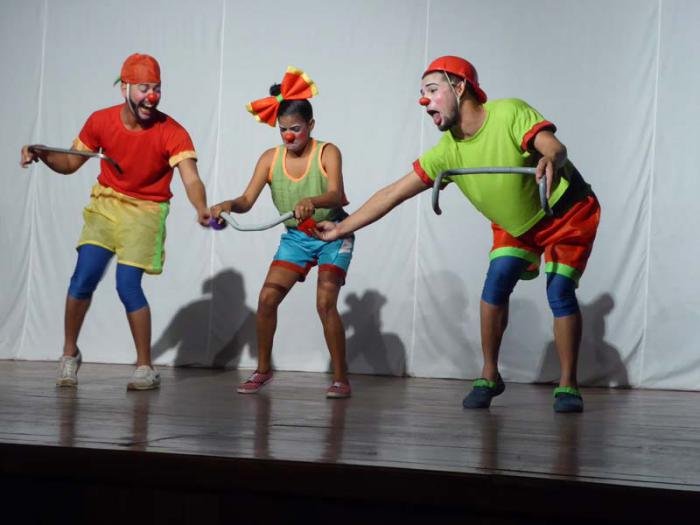
A clowns show needs dramaturgy, aesthetics and a conscious exercise on the part of the actor pursuit of the message, as in any other theatrical form. Photo: Leidys María Labrador Herrera
“Actors in our profession have the ability to approach lives from a character. The actor in the dramatic theater is going to play the role of a doctor and does not necessarily have to have studied medicine, he can play the role of a drunkard and be a teetotaler, but in the case of the clown the difference, which is not tacit, but only the adaptation to this concept of acting, is that yes, we are playing a character who is the clown, but it has been made with the actor’s own characteristics. There is no distance between the character I am going to play and the person I am.
“In any case, the actor who plays a clown, whether it be on a birthday, in a theatre, in a circus… when the performance is over, is once again the normal person who goes home to face his routine. What happens is that this character is constructed from his own psycho-physical characteristics. The mythical example is that of Charles Chaplin, who built a Charlot, the little tramp, through his own experiences.
A similar opinion is shared by young Adrián Bello Suárez, who has carried out all his acting growth in Teatro Tuyo.
“My clown’s name is Belo, and I started to find him after I had been in the group for some time. In fact, I’d say he’s still a long way off. I have drunk from Belo and Belo from me, I could tell you that we are walking hand in hand along the same path. Because that’s what the art of clowning is all about, of finding the clown that we all have inside us which is unique for each person, and building it with your own emotions, feelings…”.
Such experiences show that playing a clown is more than just having a red nose. Perhaps it is from this ignorance that the superficial vision of those who believe that dressing up in colorful costumes and stumbling senselessly is to be a clown.
THE DEFORMATION OF THE REAL CLOWN
The children are seated awaiting the presentation. The birthday boy’s parents are also anxious to see the protagonist who, frankly, has a tight budget The time comes, but there is no music of bugles or cymbals, what begins is the thunderous reggaeton and the clown comes out wagging his waist in an act that has nothing to do with comedy but borders on the obscene.
I’m not saying this is always so. We cannot commit the sin of absolutists and say that all those who today entertain in children’s parties act in this way. But how many of us haven’t had regrettable experiences like that? The saddest thing is that this person continues to do his “job” and we continue to open the doors of birthday parties to him.
NOTE: Sound file is in Spanish:
https://soundcloud.com/user-315115220/opiniones-acerca-del-clown-mp3
For Rubén Darío Salazar, director of the “Teatro de las Estaciones” group, this process implies a step backwards when talking about clowning.
“The art of clowning in our region, and in Cuba specifically, has suffered a regression. This is because it is something that many people feel entitled to do without, schooling, without training. They think they can just play the clown without any of that. But the worst part is that people believe it, and they are paid and hired and they cause a distortion in the profession.
“Being a clown has long been an art form looked down upon, and I don’t know why, because we have had in our country people with a powerful history in clowning, like Edwin Fernandez, known as Trompoloco. He was an actor who played the clown with a mixture of impressive lyricism and satire. I believe that this has been lost, it has been deformed, it has been devolved, without any of us noticing that the art of clowning is the new comedy, if we take it seriously, with the discipline and commitment it demands”.
TRIVIALIZATION, A LATENT PROBLEM
Ernesto Parra himself has a similar opinion. He says the trivialization of the art of clowning is a resident problem in today’s Cuba, especially when the real perspective of any actor performing a clown is lost, driven by economic need.
“We cannot say that the art of clowning is made in a single way, nor that it has these or those typical characteristics. The clown genre, according to the master Dario Fo (Italian actor and writer, recipient of the Nobel Prize for Literature), is the preparation of an artist who becomes a total actor and is the one who transmits, through humor, not as an end but as a means, an emotion, poetry, an idea, tackles a problem. It is not the stereotyped clown, of screams, of colourings, of jumps, of falls, of stumbles. Although they are elements that he uses to construct his dramaturgy, they do not constitute his main objective. That is to say, to take the spectator by the hand to arrive from humor to touch the soul and to move”.
Emptiness, lack of real, direct communication with the public, and in many cases, a total lack of tools to enrich the character, are some of the most common aspects when analyzing this phenomenon of the “multiplication” of clowns. The sharp vision of the master Roberto Gacio, who is a theatre institution in Cuba, allows us to evaluate some of the most notorious weaknesses that these clowns face.
“It is necessary to investigate, deepen, and be in a very serious position to transmit messages, not so much from social reality as from human existence. This, like other phenomena, is also marked by the loss of values, the lack of interest in personal and collective improvement and, of course, the economic factor.
“The way to save the clown’s art is to realize that you have to say things out of sensitivity, out of humanity. The clown and the clown, in general, are also like big children, who talk about serious adult things or children’s things, but with a lot of tenderness”.
Logically, like other similar dilemmas that take place within all artistic expressions, this process cannot be seen as alien to the social context, nor divorced from everyday realities or the way people perceive the world around them. These are aspects to which researcher, theatre critic, and director of the magazine Tablas-Alarcos, Omar Valiño Cedré, attaches great importance.
“There are two different dimensions to the problem. The abundance of clowns, which in reality there are not, should not be seen as excessively pernicious. It is simply an economic reality, in which people who have a certain capacity for animation, entertainment and the world of acting, seek that economic reinforcement for their profession, although they are not necessarily clowns [themselves]; and of course, there is the dimension that Teatro Tuyo and other artistic groups and entities represent, which is the dimension of the real clown, of the clown as a very singular priest of the performing art.
“Being a clown is the greatest thing in the performing arts. A real clown moves an amount of energy, of metaphors, of symbols, of abilities around him that is hardly achievable with any other scenic material. I believe that the challenges are, for all those who want to evolve from one side to the other, to know technically, spiritually and intellectually, what a clown is and how to train. Knowing how to be up-to-date, how to be effective in terms of communication and how to establish new pacts, new links with today’s public that is not the same as it was a few years ago”.
That is precisely the perspective of a group that has managed to fill theatres, to be loved by young and old and become an obligatory reference point whenever there is talk in Cuba of the worthy profession of the clown.
Subscribe to Blog via Email
| M | T | W | T | F | S | S |
|---|---|---|---|---|---|---|
| 1 | ||||||
| 2 | 3 | 4 | 5 | 6 | 7 | 8 |
| 9 | 10 | 11 | 12 | 13 | 14 | 15 |
| 16 | 17 | 18 | 19 | 20 | 21 | 22 |
| 23 | 24 | 25 | 26 | 27 | 28 | 29 |
| 30 | 31 | |||||

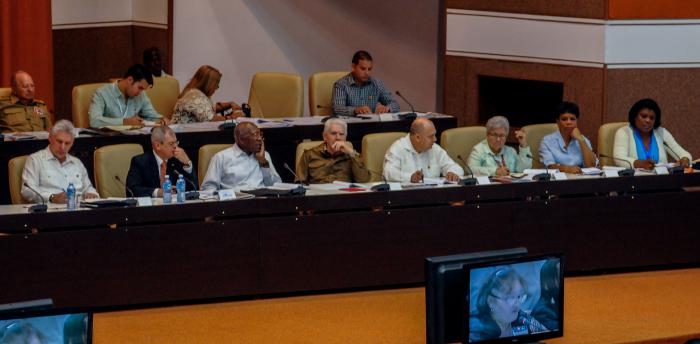
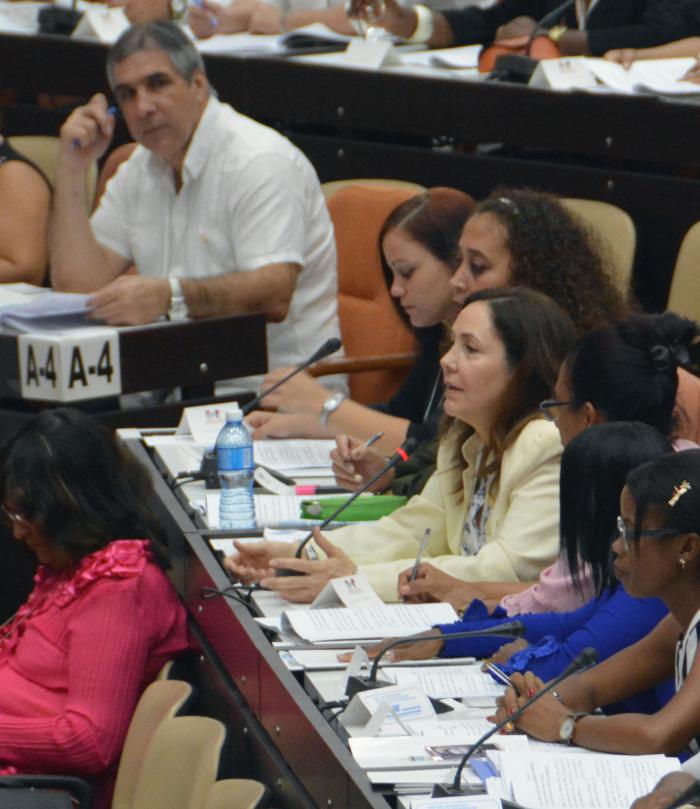
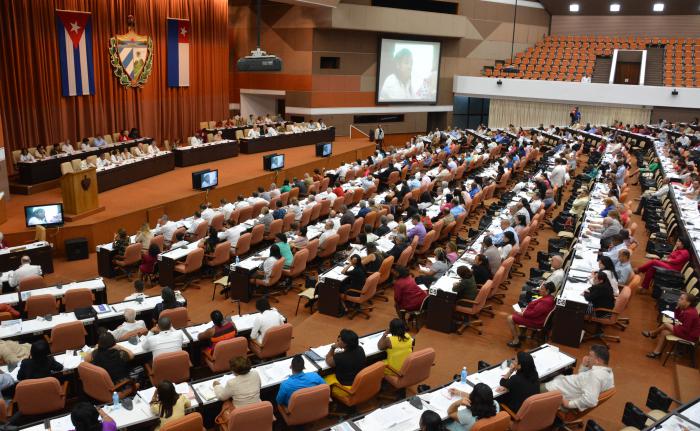

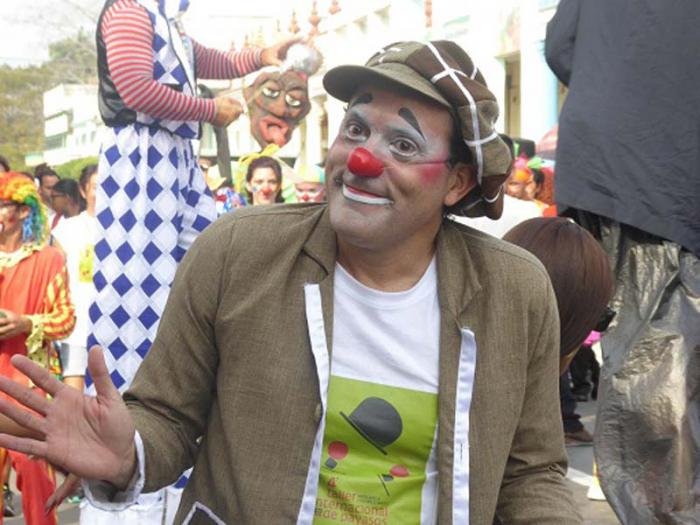
You must be logged in to post a comment.